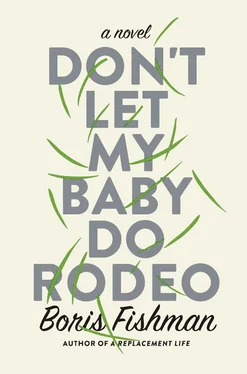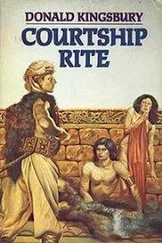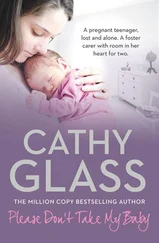+
The morning’s camaraderie still high on their faces, the Rubins were sat down for an exit interview by an Asian woman named Tran Caldwell. Instantly, they wondered if they had been given an immigrant because of their background. Then they wondered if they were given someone so young because they didn’t rank highly with the agency. (Was this Slab-Face’s subterfuge from afar?) Tran Caldwell had high, queenly cheekbones sprayed with a pollen of freckles, and the black sheets of hair that fell from her head glistened with a malevolent healthfulness. Elsewhere, she was as slight as a child — Maya, not a loomer, loomed over her. Maya, who had resolved that the agency employed only adoptive mothers, decided that Tran Caldwell had to adopt because her body was too small to hold a whole other being. Tran, however, was herself an adoptee. An alfalfa farmer from Missouri and his wife had taken her in after Da Nang — their son had been killed shortly before the Americans left. They were still out in Missouri, years past retirement, making war on weevils and armyworms. All this Tran offered by way of introduction.
“There was one last thing we wanted to speak to you about,” she said. “It’s the decision you make about open versus closed adoption.” She allowed the words to settle. Alex was rattled by the transformation of this child-woman into yet another person intending to discuss children in a businesslike way. “Have you given any thought to the issue?”
“What issue?” he said.
“Whether the child will know he or she is adopted,” Tran said. As Alex fought a distasteful expression, Tran said: “You don’t have to discuss it with me. It’s a private decision. But I wanted to tell you what it was like in my case — because I’ve been on both sides.” She was gazing directly at Alex, as if — he felt — she intended to challenge him. His oracular flight in the brochure had led him to believe that a turnaround was in the offing for the Rubins, an atonement for Slab-Face and presenters who had rattled off facts about children as if they were reading to a hospitality conference. This expectation now stalled.
“It’s natural to want no strings attached,” Tran said. “There’s that impression it’s cleaner. Who wants competition from the birth parents?” Maya and Alex exchanged glances, this additional challenge never having occurred to them.
“But what children tend to do when they know they’re adopted but they don’t have clear answers is they make up the birth parents. They tell themselves stories in order to make sense of having been given away. They imagine they were given away involuntarily, which leads to suspicion of the adoptive parents. They say, ‘My real parents really love me, and I am going to go live with them soon.’ They run away. Or the opposite: ‘My parents didn’t love me, so they gave me up.’ These are hard things for a little person to wrap their brain around.”
“I thought you were supposed to say ‘place’ instead of ‘give up,’” Alex said.
Tran closed her eyes and smiled. “All that stuff is silly, I think,” she said.
“So the farmer — he told you?” Alex said.
Tran nodded. “I grew up knowing it.”
“Excuse me,” Alex said. “It’s not exactly avoidable in your case.”
“That’s true,” Tran smiled. Maya looked at Alex reproachfully.
“And you told your children?”
“Here,” Tran said, reaching into her purse. She fished in a date book and pulled out a photo of three children bundled in neon-colored jackets on a playground shrouded in snow: two girls and one boy in various states of developmental anarchy — jug ears, mutinous teeth, shambolic hair. Maya marveled at the cycle: a Vietnamese woman had adopted three white children.
“They fit into your life.” She replaced the photo, Maya watching it disappear with envy.
“So they feel like yours?” Maya said. “I’m sorry — maybe I’m not supposed to ask that.”
“Even yours don’t feel like yours half the time,” she said. “At least that’s what they tell me. As an adoptive parent, the question on your mind is: Is it me? Is this him being a kid or is this him being adopted? But we forget that birth parents usually deal with the same things — they just don’t have the self-consciousness that makes them wonder these things. Also: You can ask whatever you want.” She paused diplomatically. “Mr. and Mrs. Rubin. I am able to have children. But I wanted to adopt.”
Alex snorted. High comfort these people supplied — now this person was waving around the fact that she was not afflicted by the same curse as the Rubins. “Excuse me,” he said. “You’re proposing we share custody with the birth parents?”
“Of course not,” Tran said. “I don’t want to say that involving birth parents is always a pleasure. Some don’t stay in contact. Some lose touch when they move away, or break up, or start their own families.”
“Some won’t let you be,” Maya added.
“Believe it or not, that happens more rarely,” Tran said. “You work out terms. They’re legally bound to obey them. I am saying only this, from experience: One day, your child will ask: ‘Why am I tall?’ ‘Why is my hair like this?’ And they want to know. You can’t bullshit a child. Pardon my language.”
“And so being told their mother and father are not their actual mother and father at age six is less shocking than a white lie about recessive genes?” Alex asked with the authority of a biologist.
“You tell them at age zero,” Tran said. “You tell them at age one. You have pictures out. The birth parents visit. They grow up knowing it from the beginning. You have no idea the resilience of children.”
“Then they’ll be resilient about not knowing it,” Alex said.
Tran pursed her lips and nodded, as if she’d asked for a donation and been declined.
“Wait, Alex,” Maya said.
“Maya, we have a long ride home and work tomorrow,” he said.
“I didn’t want to upset you,” Tran said. “So many of the counselors here lay out the facts and leave it at that. I’ve learned from mistakes. I wanted to share that with you. It was at my initiative that the orientation was revised to include this type of conversation.”
“Every family makes its own rules,” Alex closed the discussion.
+
The Rubins rode home without speaking, Alex banging the steering wheel with his thumb as if rock were on the radio and not classical.
“I can hear you boiling,” he said finally. “It’s a cult, they are.”
“You were rude to her.”
“I think it’s rude to ask me to pay money for the pleasure of being told what to do with my own child. Do you ever think about it, Maya? They should be grateful to us, but instead they treat us like we did something wrong.”
“You were rude to her because she was small. And Asian. A woman.”
“Forget mammography, Maya. Open up a psychologist’s office.”
“You are always waiting for the world to recognize what a service you are performing for it.”
He looked over incredulously. “Are you upset? Is your railroad mind chugging along? I am upset, too. Don’t take it out on me.”
Maya stared vacantly at New Jersey outside her window. Post-beach traffic was beginning to clot the highway, sedans overstuffed with children, umbrellas, and beach chairs. A truck honked at a convertible filled with beautiful girls.
“Do you think we live in a beautiful place, Alex?” she said.
“What?” Alex said.
“I think back to Kiev, and I realize: Kiev was ugly. It has its cathedrals and streets where you think you’re in Paris. But, really, it’s ugly. But I never noticed, you know. I didn’t know it was ugly until I left. And all these people in the cars — they don’t know that New Jersey is ugly.”
Читать дальше












